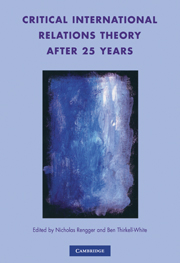Book contents
- Frontmatter
- Contents
- Preface
- Notes on contributors
- Editors' Introduction
- Looking back from somewhere: reflections on what remains ‘critical’ in critical theory
- Transnational theories of order and change: heterodoxy in International Relations scholarship
- Happy Anniversary! Time and critique in International Relations theory
- Is critical theory always for the White West and for Western imperialism? Beyond Westphilian towards a post-racist critical IR
- The promise of critical IR, partially kept
- Towards a sociology of global morals with an ‘emancipatory intent’
- Between Kant and Pufendorf: humanitarian intervention, statist anti-cosmopolitanism and critical international theory
- Index
Is critical theory always for the White West and for Western imperialism? Beyond Westphilian towards a post-racist critical IR
Published online by Cambridge University Press: 06 July 2010
- Frontmatter
- Contents
- Preface
- Notes on contributors
- Editors' Introduction
- Looking back from somewhere: reflections on what remains ‘critical’ in critical theory
- Transnational theories of order and change: heterodoxy in International Relations scholarship
- Happy Anniversary! Time and critique in International Relations theory
- Is critical theory always for the White West and for Western imperialism? Beyond Westphilian towards a post-racist critical IR
- The promise of critical IR, partially kept
- Towards a sociology of global morals with an ‘emancipatory intent’
- Between Kant and Pufendorf: humanitarian intervention, statist anti-cosmopolitanism and critical international theory
- Index
Summary
Abstract. In appraising critical IR theory after twenty-five years, this article begins by asking whether critical theory implicitly reinforces the ‘superiority’ of Western civilisation and naturalises Western imperialism. In revealing the Eurocentrism of much of critical IR theory the article proceeds to reconstruct it by steering it in fresh non-Eurocentric directions. This is not to say that extant critical theory is moribund since it undoubtedly has much to offer. But it is to say that until the problem of Eurocentrism is exorcised from its body theoretique, critical theory inadvertently lies in danger of joining the ranks of problem-solving theories. The first two sections deconstruct the leading schools of critical IR theory – Gramscianism, postmodernism and feminism – to reveal their frequent lapsing into Eurocentrism, while the final section seeks to decolonise ‘Westphilian’ critical IR by reconstructing a ‘post-racist IR’. And this in turn leads on to the conclusion, which sketches out a post-racist emancipatory political project that can help begin the urgent task of effecting global reconciliation between East and West.
Introduction
The short answer to the question posed above in the main title is ‘by no means always, but surprisingly far more often than might be expected’. Of course, it might be thought that it would be a standard critical IR theory refrain to debunk those generations of ‘scientific’ theories which proclaim the positivist fact/value distinction as a means to hide their underlying meta-narrative that ultimately glorifies Western civilisation. But the acute irony is that Gramscian IR and other versions of critical theory often, albeit inadvertently, reproduce the very Eurocentrism that so-called objective mainstream IR scholars all too frequently slip into.
- Type
- Chapter
- Information
- Critical International Relations Theory after 25 Years , pp. 91 - 116Publisher: Cambridge University PressPrint publication year: 2007
- 4
- Cited by



